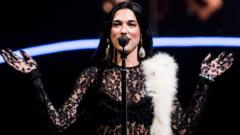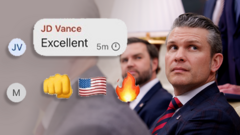National Security Adviser Mike Waltz has claimed full responsibility for a group chat leak where classified military plans were discussed, inadvertently including a journalist. While President Trump downplays the event's significance, calls for investigations are growing, raising concerns over the breach of protocol.
Mike Waltz Accepts Accountability in Signal Chat Breach Involving Military Plans

Mike Waltz Accepts Accountability in Signal Chat Breach Involving Military Plans
The National Security Adviser admits to a group chat leak that included sensitive military discussions, as pressure mounts for investigations from lawmakers.
National Security Adviser Mike Waltz has publicly assumed full accountability for a significant breach involving a Signal group chat that included sensitive military discussions regarding potential strikes in Yemen, which featured an unintended participant—a journalist, Jeffrey Goldberg, editor-in-chief of Atlantic magazine. During an interview with Fox News, Waltz expressed embarrassment over the incident, stating, "I take full responsibility. I built the group."
Despite the serious nature of the breach, President Donald Trump and U.S. intelligence officials have attempted to downplay its consequences, asserting that no classified information was shared. However, calls for an investigation into this "major breach" have been voiced by both Democratic and some Republican lawmakers, reflecting growing bipartisan concern.
The revelation surfaced when Goldberg reported having been accidentally included in the chat, where he allegedly viewed classified military plans, including detailed discussions about targets, timing, and weaponry intended for operations. The article detailing the incident indicates that the sensitive content was intentionally withheld to minimize security risks.
Waltz was unable to clarify how Goldberg was included in the chat, but he did contest Trump's claims, denying that a staff member was responsible for the incident. He insisted that another associate should have been present in Goldberg's stead. "We've got the best technical minds looking at how this happened," he emphasized, adding uncertainty over not recognizing the journalist’s phone number.
In contrast to the assertions of Waltz and other officials, the director of national intelligence, Tulsi Gabbard, and CIA Chief John Ratcliffe denied any classified exchanges during a Senate hearing. The chat reportedly also included Vice President JD Vance and Defense Secretary Pete Hegseth, further complicating the narrative surrounding accountability and security measures.
The implications of the leak extend beyond operational concerns; critiques of the Trump administration's national security oversight surfaced in the wake of this incident. Mark Warner, Democratic vice-chairman of the Senate Intelligence Committee, criticized the situation, branding it a reflection of an “incompetent national security strategy.”
In the backdrop of the incident, discussions uncovered in the chat revealed contempt for European nations perceived as reliant on U.S. military support for key shipping lanes. The implications of high-ranking officials discussing sensitive matters on a civilian app have sent shockwaves through Washington, with the situation sparking a lawsuit from American Oversight, a non-partisan watchdog. This group accuses officials of violating federal record-keeping laws by configuring the chat to automatically delete messages, raising questions about transparency and accountability in government communications.
Notably, the National Security Agency recently alerted its employees to vulnerabilities within the Signal platform, further compounding the anxieties surrounding operational security in the digital age.






















